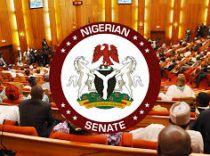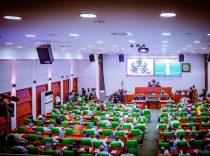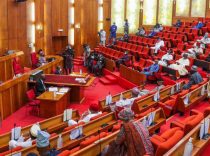The House of Representatives on Wednesday, 7 October 2020 deliberated on recent incidents of abuse and arbitrariness involving the Special Anti-Robbery Squad (SARS) of the Nigeria Police Force and resolved to call on the Inspector General of Police (IGP) to take decisive action to address police brutality and human rights violations. The House also resolved to undertake review of existing legislation, particularly section 215(5) of the Constitution of the Federal Republic of Nigeria, 1999 (as amended).
The Majority Leader, Hon. Ado Doguwa (Kano: APC) in presenting a motion on this matter, expressed dismay over continuous human rights violations by SARS that has led to loss of lives and property. He added that efforts to seek redress for these violations by victims were met with concerted opposition by police authorities including threats to their lives. In contributing to the debate, Hon. Akinola Alabi (Oyo:APC) noted that the Police is an institution that citizens should look at with pride and added that SARS ought to be a menace to armed robbers and not Nigerians as a whole. Hon. Toby Okechukwu (Enugu:PDP) stressed that this issue is germane and important, acknowledging that citizens are hurting. He called for section 215(5) of the Constitution to be looked into to ensure that there is individual responsibility for conduct of police officers while on duty. On this section, Hon. Shabba Ibrahim (Kogi: APC) stated that this provision should be expunged as it contravenes the principles of separation of powers and rule of law.
Section 215(5) of the 1999 Constitution provides that the content of directions, if any, given to the Police by the President, Governor or an authorised Minister/Commissioner with respect to the maintenance and securing of public safety and public order shall not be inquired into by any court.
Prior to the motion, the Speaker, Hon. Femi Gbajabiamila (Lagos:APC) in a statement on the misconduct and abuse of authority by officers of the Nigeria Police Force (NPF) across the country and the need for additional police reforms, noted that everyday interactions between the police and citizens result in acts of horrific brutality, extortion/retribution against the Nigerian people. The Speaker added that there is lack of accountability for this breach of public trust and as such the legislature will now step in to introduce an independent, fair/practical approach to ensure they are held to the highest standards of professional conduct. He concluded his remarks by stating that the House with work with the Nigerian Bar Association and civil society to draft new legislation that establishes a system of accountability that holds erring members of the Police Force to account for their conduct and impose civil and criminal liability for violations of the police code; and also compels the NPF to take responsibility for failures of training and discipline that leads to violations.
Following contributions to the debate by a considerable number of legislators, the House resolved to call on the IGP to:
- Take decisive action to address police brutality and human rights violations;
- Produce a comprehensive record of disciplinary and/or judicial action taken against police officers for abuse of power in the past five years; and
- Produce an immediate plan for identification and compensation of victims of police brutality and harassment.
The House also agreed to set up a Joint Committee on Justice, Human Rights and Police Affairs to hold a public investigative hearing on the activities and human rights violations by SARS. Lastly, it was resolved that immediate legislative actions will be taken to amend existing laws especially section 215(5) of the 1999 Constitution to allow for judicial review of conduct of police officers and to bring forward a legal framework for holding the NPF accountable for actions taken in the course of performing their duties and allowing for civil liabilities.
It would be recalled however, that the National Assembly recently passed a revised Police Act in July, which was signed into law by the President in September 2020. It provides guidelines regulating the exercise of police powers, mandates trainings for officers and police respect for human rights, establishes an official complaints’ unit, as well as mandatory regular reporting by the Police to the National Assembly, the Attorney General of the Federation and Magistrates on police arrest records, including deaths of persons in custody and remedial actions, if any, taken. It is expected that the National Assembly prioritises the implementation of the Act as well as the revision of the accompanying 1968 Police Regulations, which contains more detailed aspects of policing and rules on police conduct. This is more so considering that the National Assembly has already mandated the Minister of Police Affairs and IGP via the Act, to revise the said Regulations without which, substantive reform of police operations cannot be undertaken.





